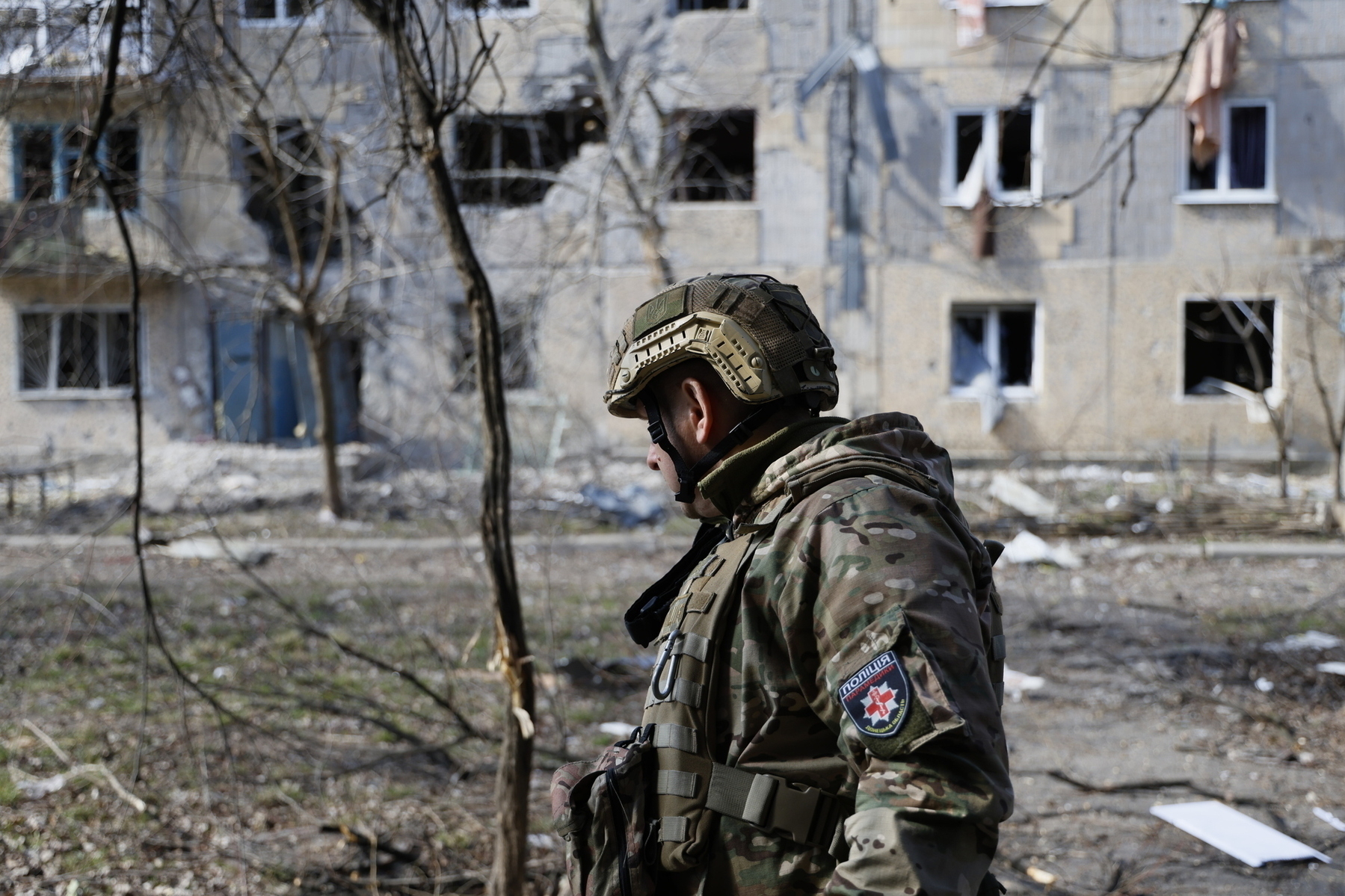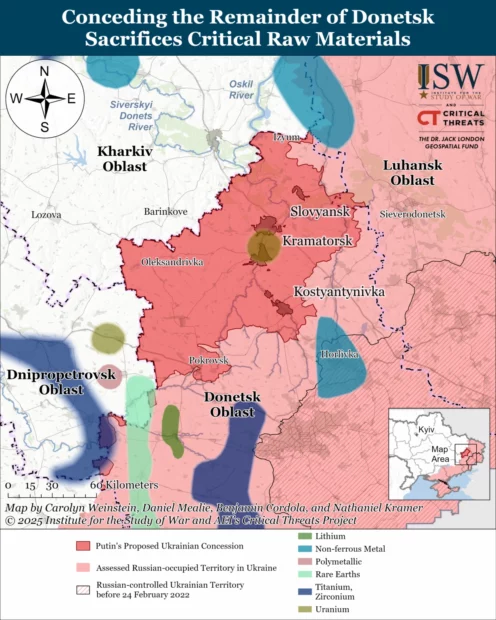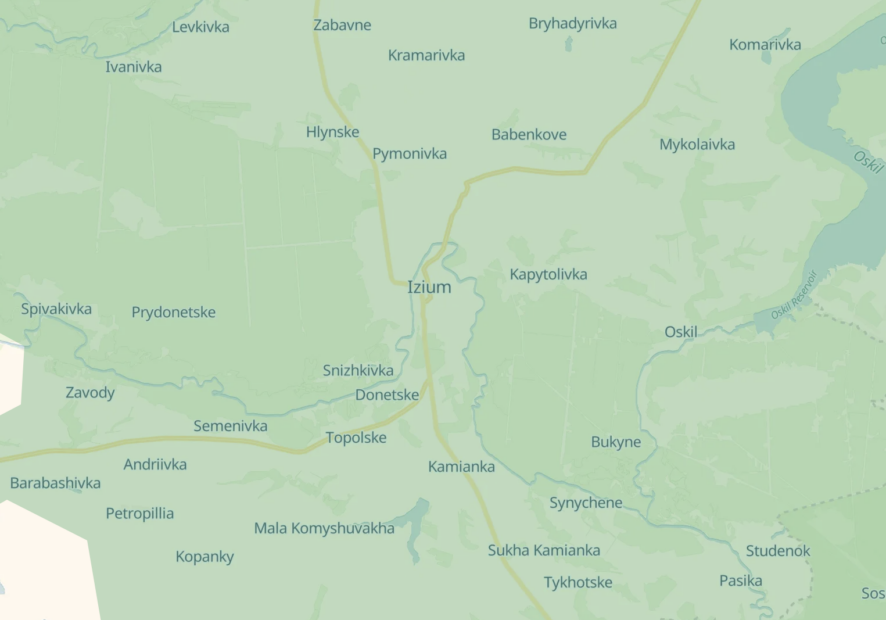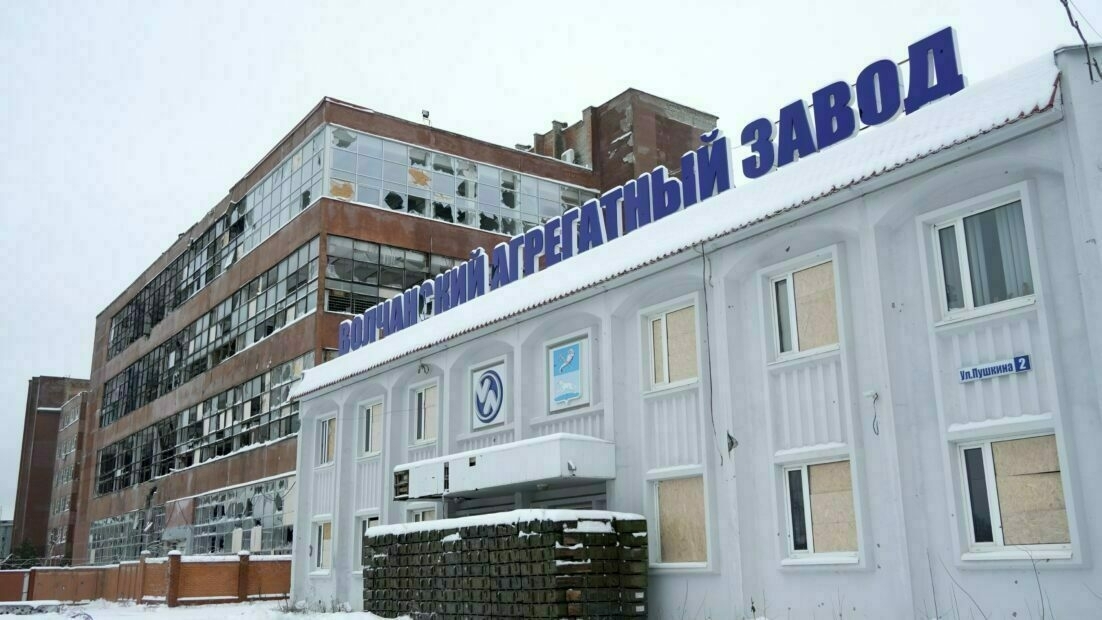
Russian President Vladimir Putin met President Donald Trump's envoy Steve Witkoff in Moscow on Aug. 6. During this meeting, Putin reportedly offered Ukraine to “cede” the Ukraine-controlled territories in Donetsk and Luhansk oblast with no security guarantees, in exchange for halting the war.
Russia has occupied Crimea and parts of the Donetsk region since 2014. During 11 years, Ukraine has built a fortress belt that stretches along the highway H-20 from Konstiantynivka in the north to Sloviansk in the south.
In 2022, Russia failed to capture Sloviansk and envelop the fortress belt, allowing Ukraine to reinforce the cities within the belt.
During the multilateral meeting in Washington, Ukraine's President Volodymyr Zelenskyy said that the discussion of "proportional" exchange for Russian occupation of Eastern territories is possible only if Russian and Ukrainian leaders meet, the Wall Street Journal reported.
Zelenskyy noted that realizing this idea would be difficult because Ukraine would have to relocate many people from Ukrainian-controlled territories. Ukraine's president also said that Ukraine can’t make this decision without a referendum.
The experts of the Institute for the Study of War (ISW) said that the complete occupation of the Donetsk region threatens the Kharkiv, Poltava, and Dnipropetrovsk regions. On the other hand, such a proposal has no legitimate basis in international law.
Russian occupation of Donetsk oblast endangers Kharkiv region
The main logistics centers for the Ukrainian army in the region are Sloviansk and Kramatorsk, which form the northern part of the fortress belt. Druzhkivka, Oleksiyevo-Druzhkivka, and Kostyantynivka comprise the southern part.
Russian occupation of the entirety of Donetsk oblast would bring Moscow’s troops to the region's administrative border, a far less advantageous position for Kharkiv oblast and other regions neighbouring Donetsk.

Elina Beketova, a research fellow at the Center for European Analysis, warned that the complete takeover of the Donetsk region would have catastrophic consequences.
"The frontline would shift about 80 kilometers westward, giving Russia open terrain. With no natural obstacles, the flat steppe would provide a direct path to Kharkiv, Poltava, and Dnipro," Beketova explained.
The city of Izium, often called the "gateway to the Donbas," is a key logistical hub in the southern part of the oblast. The M03 highway, which connects Kharkiv to the southern Donetsk and northern Luhansk oblasts, runs through the city.
Izium also has rail links to Kharkiv, Sloviansk, Kramatorsk, and Lyman. Those are key military supply routes, critically important for sustaining Ukraine's defensive operations.

Ivan Tymochko, head of the Reservists' Council, explained that if Russia gained control of Izium, it would be able to exert pressure on both the Kharkiv and Donetsk regions.
"Essentially, Balakliia and Izium lie along key routes. If we look northward, they lead toward Chuhuiv and Kharkiv. If we look southwest, they head toward Kramatorsk and Sloviansk," Tymochko said.
If Russia were to occupy the Donetsk oblast fully, Ukraine's army would be forced to urgently build new defensive lines in the Kharkiv region.
The landscape there is not favorable for defense because of the open fields and natural obstacles like Oskil and Siverskyi Donets rivers, which are located too far east to be strategically valuable.
What Ukrainian and international law says
In his official statement, President Zelenskyy rejected Putin's demands on Donetsk and Luhansk oblasts.
"The answer to the Ukrainian territorial question is already in the Constitution of Ukraine. No one will deviate from this – and no one will be able to. Ukrainians will not gift their land to the occupier," said Zelenskyy.
The Constitution prohibits transferring or renouncing any part of the state's territory. According to Article 2, Ukraine's territory is indivisible and inviolable.
Altering the territory of Ukraine is resolved exclusively by an all-Ukrainian referendum, the Constitution says. However, referendums are currently impossible because martial law prohibits any form of voting.
Kateryna Busol, Associate Professor at the Law Faculty of the National University of Kyiv-Mohyla Academy and the British Institute of International and Comparative Law, told Gwara Media that current international law — particularly the UN Charter — contains several key principles that govern the transfer of territory from one state to another.
These include foundational principles such as respect for territorial integrity and the inviolability of borders. Although these principles are largely declarative, the UN Charter contains a binding norm prohibiting the threat or use of force.
Busol said that, in this context, what matters is not just the legal formalization of agreements between states — even when they are expressed in so-called "peace agreements."
What matters even more is the element of voluntariness and informed intent by the parties involved. She noted that agreements must be based on free will, without external pressure or coercion.
The expert explained that, according to the 1969 Vienna Convention on the Law of Treaties, the treaty is void if its conclusion has been procured by the threat or use of force in violation of the principles of international law.
In the context of potential agreements or “peace deals” between Russia and Ukraine, the way the parties communicate — whether confidently or cautiously, or under pressure — will carry particular significance.
Determining whether any direct or indirect coercion is exerted on the Ukrainian side will be critical. Coercion includes physical force, overt threats, and diplomatic, political, or economic pressure, which could breach the principle of good faith in international law.
Busol said the Chagos Archipelago case — the last British colony returned to Mauritius — is an example of a legitimate territorial transfer. She highlighted that the United Kingdom agreed to this transfer following an advisory opinion by the International Court of Justice and in response to a UN General Assembly resolution.
Ultimately, London recognized the need to return the territory to Mauritius not just de jure, but also de facto.
Any transfer of territory between states must adhere to international law and not involve military aggression or political pressure, which Russia isn’t hesitant to exert.
Maksym Vishchyk, legal advisor to the Global Rights Compliance Foundation, noted that any peace agreement imposed on Ukraine by force would be considered void and carry no legal effect. This gives Ukraine the right to challenge any such territorial changes.
Moreover, any agreement that seeks to formalize an annexation in a peace deal does not alter the international legal status of those territories as occupied.
Therefore, Ukraine would not lose its right to self-defense or to liberating territories seized by Russia.
Russian crimes in the temporarily occupied territories
Bosul also said that the human-centered argument is especially critical. A "swap deal" of any sort is not just about land — it's about the fate of the people who remain under Russian occupation.
The longer the international community or Ukraine tolerates Russian control, the greater the risk for people from Ukraine living in those areas to suffer from atrocities, including enforced disappearances, torture, sexual violence, and executions.
Hypothetically, if Ukraine were to consider ceding any part of its territory, doing so would be impossible because of the documented, systemic crimes committed by Russia, Bosul said.
She added that the Kremlin's objectives go far beyond territorial claims. The world's largest country by landmass has no shortage of resources. Their true goal is the destruction of Ukraine as a sovereign state. Therefore, any concessions or freezes in the conflict would result in a Minsk 3 scenario, merely allowing Russia to rebuild its military and attack again.
Russia is actively promoting the idea of abandoning investigations into international crimes. In practice, this would mean halting inquiries into both past and future atrocities committed in occupied areas.

Moscow is inconsistent in its demands. It requests that Kyiv cease prosecuting Russian soldiers and, at the same time, it runs trials against Ukrainian prisoners of war merely for participating in combat. This violates international law, particularly the principle of combatant immunity.
Ukraine cannot waive its obligation to investigate international crimes, Bosul says. They include the four most serious categories: war crimes, crimes against humanity, genocide, and the crime of aggression, outlined in instruments like the Rome Statute of the International Criminal Court.
She explained that there is no statute of limitations for these crimes. That's why courts in countries like Australia and Germany continue to prosecute former concentration camp guards, even those in their 90s. As such, any provision suggesting that a state can avoid the duty to prosecute international crimes is legally null and void.
Bosul also said that, under international law, Ukraine cannot and must not renounce its sovereign territory. A state cannot withdraw from the UN Charter or abandon core international treaties simply because of Russian threats.
In her view, Ukraine's strategic position must remain firm: regardless of what terms Russia proposes or tries to impose, certain conditions will always be legally null and void.
Photo credit: Member of the evacuation group "White angel" that helps to transport Avdiivka locals to the hospital and does evacuation missions. March 2023 / Oleksandr Babenko for Gwara Media
Thank you for reading this article! Here in Kharkiv, we're anxiously watching the lengthy diplomatic acrobatics surrounding Russia's war in Ukraine. With what's happening on the frontline right now, it's hard to take any sort of future "peace deals" and "land swaps" with Moscow seriously. So we plan to just keep reporting on events unfolding. Please, consider supporting our Kharkiv-based journalism by buying us a cup of coffee or subscribing to our Patreon.
Read more
- “Defend the defenders.” People in Kharkiv protest against tougher punishments for soldiers disobeying orders, advocate for fair trials
- Opinion: US and Europe’s divide on Ukraine
- Opinion: How Ukrainian resistance maintains political freedom in Russian-occupied territories
The post Russia wants to occupy Donetsk, Luhansk oblasts fully in exchange for freezing war. Here’s what law says about that appeared first on Gwara Media.
